5 Essential Vitamins For Hair Growth To Include In Your Diet
Incorporate the most crucial vitamins for hair and scalp health in your diet.
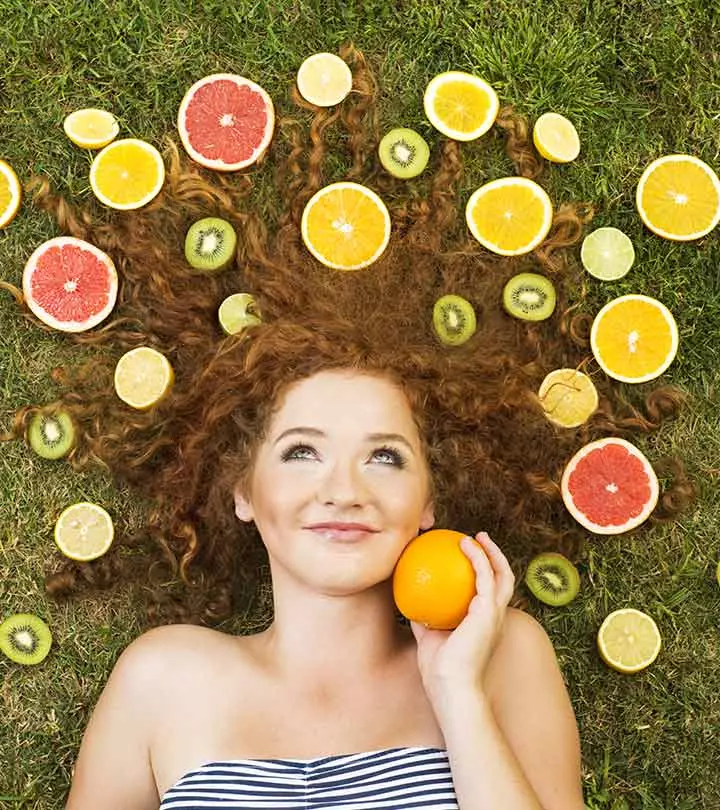
Image: Shutterstock
Most of us find it difficult to grow thick, long hair. Trying hair care treatments means regularly shelling big bucks, which is not a feasible option for many. But, there is a remedy – using vitamins for hair growth. That’s right! Instead of heading to salons for regular hair maintenance and care treatments, eating the right vitamins can improve your hair health. Don’t believe us? Keep reading to know more.

While it is necessary to visit your hairdresser, take care of your hair, and be patient, we often overlook the importance of nutrition.
When people say that healthy hair is a trait of good health, they are correct. Both good health and healthy hair result from a well-balanced diet that includes the proper proportions of fats, carbohydrates, vitamins, proteins, minerals, water, and fiber.
Proteins, minerals, and vitamins are the three most critical nutrients for hair. Their consumption in the correct amounts results in rapid and healthy hair growth. An appropriate diet is 90% of what you need for desired hair density and texture.
Take a look at the list of vitamins and minerals listed below to see how they help you grow healthy hair. Keep reading to know more!
In This Article
5 Essential Vitamins For Hair Growth
1. Vitamin A

Vitamin A is one of the four fat-soluble vitamins. Studies show that it plays an important role in the development of epithelial tissues, including skin, hair, and sebaceous glandsi Small exocrine glands that open on skin and hair follicles and release a waxy substance called sebum. . Sufficient vitamin A intake results in optimal sebum production, which helps moisturize the scalp for healthy hair growth (1).
Another study shows that deficiency of vitamin A may lead to alopecia (2).
Although it is important to get enough vitamin A, excess of it can also reduce the number and length of hair follicles and lead to hair loss (1).
Foods Rich In Vitamin A (3)
- Sweet potatoes
- Carrots
- Milk
- Spinach
- Dried apricots
- Mangoes
2. B Vitamins
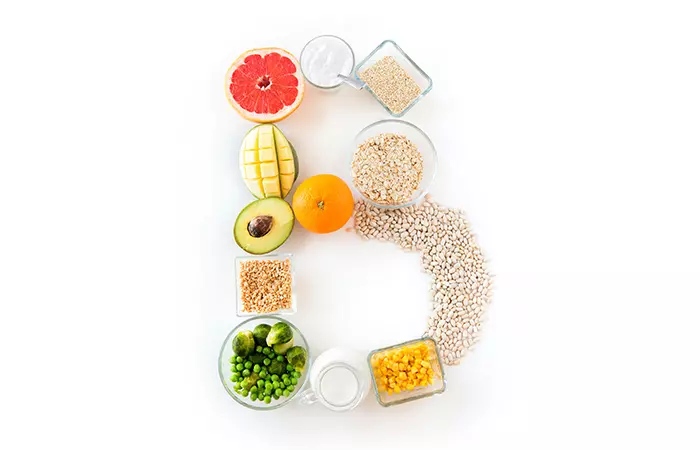
i. Vitamin B12
According to Dr. K. Harish Kumar, MD, DVL, vitamin B12 plays a vital role in the formation of red blood cells. These red blood cells carry oxygen to all body tissues, including the hair (4).
Studies show that there is potential for optimal hair growth if the vitamin B12 levels are within the normal range (5).
Foods Rich In Vitamin B12
- Cheese
- Whey powder
- Milk
- Yogurt
ii. Biotin
Biotin is known as the “hair growth vitamin.” It is one of the 12 vitamins in the vitamin B family.
A study was conducted to evaluate the efficacy of biotin in hair growth. Results showed that 18 patients with poor hair and nail growth exhibited improvement after receiving biotin (6).
Biotin deficiency may cause uncombable hair among children (6). Other symptoms include thinning hair and hair loss all over the body (7), (8).
Lancy, a blogger, tried biotin for hair growth and shared her experience. She writes, “I took biotin supplements for one month and I could notice a lovely change in my hair texture (i).”
However, there is a lack of data regarding the effectiveness of biotin among healthy individuals.
Foods Rich in Biotin (7)
- Mushrooms
- Avocados
- Eggs
- Peanut butter
- Yeast
- Sunflower seeds
- Sweet potato
- Cauliflower
- Raspberries
- Bananas
- Walnuts
- Almonds
iii. Folic Acid (Folate)
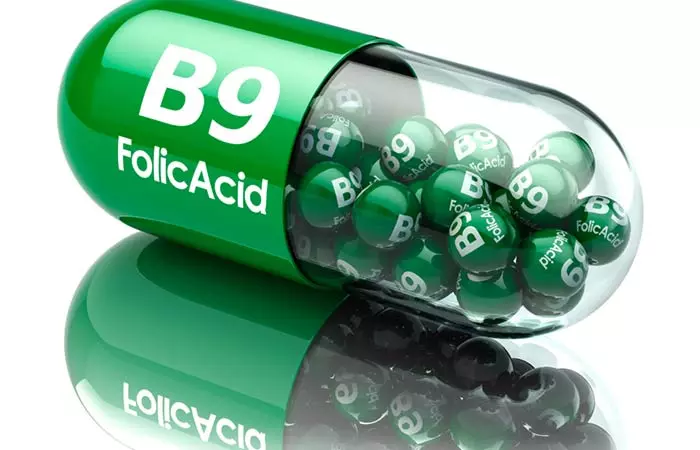
Folate is a water-soluble B vitamin. Folic acid is a fully oxidized form of vitamin that is used in dietary supplements.
It helps generate red blood cells, which ensures transportation of oxygen to all the tissues, including those that build hair. It is responsible for rebuilding hair follicle cells and preventing graying of hair and hair fall (9).
Foods Rich In Folate (9), (10)
- Kale
- Spinach
- Black-eyed peas
- Lettuce
- Brussels sprouts
- Green peas
- White beans
- Asparagus
- Beets
iv. Niacin
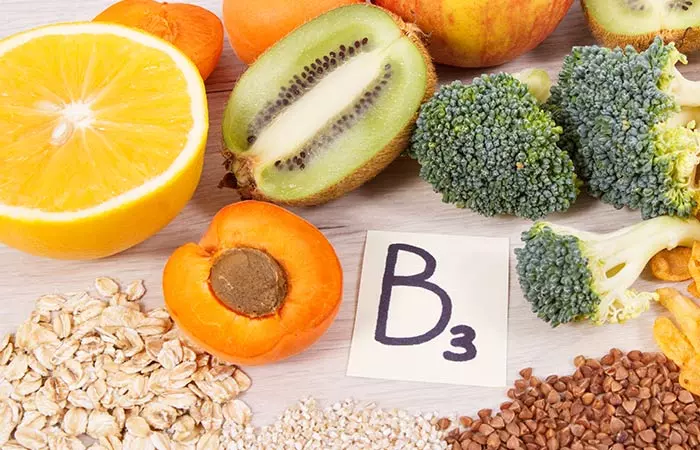
Niacin, also known as vitamin B3, is a water-soluble B vitamin. Studies show that its derivatives, octyl nicotinate and tetradecyl nicotinate, help increase hair fullness in females (11). However, more studies are warranted to establish this.
Foods Rich In Niacin (12)
- Marinara spaghetti sauce
- Brown rice
- Peanuts
- Potato
- Sunflower seeds
3. Vitamin C
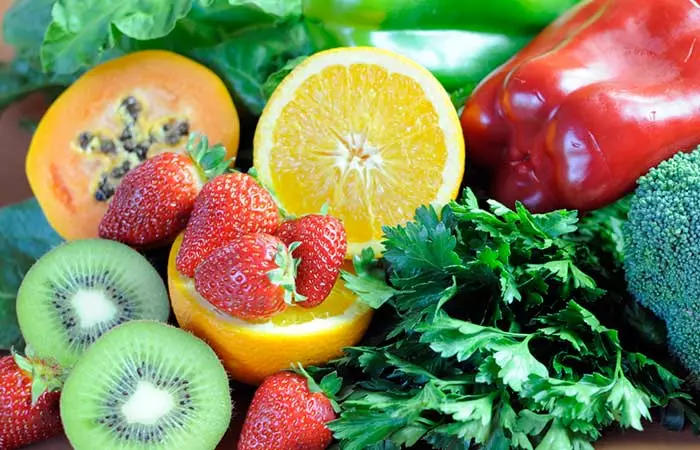
Vitamin C is also known ascorbic acid. It is a water-soluble mineral that is naturally present in some foods. It is an important physiological antioxidant that regenerates other antioxidants within the body, including vitamin E.
Studies are ongoing to find out if vitamin C restricts the damaging effects of free radicals through its antioxidant content that helps reduce oxidative stress, which can prevent or delay the development of certain cancers (13). This blockage of oxidative stress can also reduce the aging of hair (14).
In addition to that, studies show that insufficient vitamin C intake can cause scurvy. As a result, there may be bleeding around hair follicles and corkscrew hairs (15).
Vitamin C is also known to aid in protein synthesis, which in turn boosts collagen production (16). Collagen is an essential hair-building protein that promotes longer, thicker hair.
Therefore, add a lot of vitamin C in your diet for healthy hair follicles and overall hair and scalp health.
Foods Rich In Vitamin C (13)
- Lemon
- Guava
- Mandarin
- Strawberries
- Grapefruit
4. Vitamin D
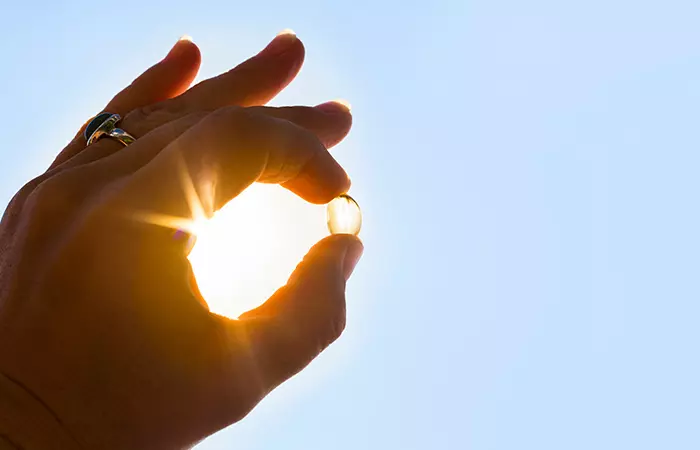
Vitamin D is a fat-soluble vitamin. Its other names include calciferol (vitamin D3), cholecalciferoli A type of fat-soluble vitamin D3 made by the skin when exposed to sunlight that helps the body absorb calcium and phosphorus. , ergocalciferol (vitamin D2), and ergosterol (provitamin D2).
It plays an important role in calcium regulation, healthy immune function, and cell growth.
Research shows that decreased levels of vitamin D may cause alopecia areata. Its deficiency may disturb the normal postnatal hair follicle cycle (17).
Another study has found that the topical application of vitamin D analog (synthetic vitamin D ointment that you rub on your skin) can treat alopecia areata (18).
Vitamin D supplementation can be therapeutic for patients with alopecia areata, female pattern hair loss, or telogen effluviumi Temporary hair loss that happens after a traumatic or stressful event like surgery, childbirth, or a serious illness. (17). However, further studies with larger groups of patients are required to evaluate the role of vitamin D supplementation in alopecia.
The actual relationship between vitamin D and hair growth is unknown. Although our body produces vitamin D naturally after exposure to sunlight, you can find it in the following foods.
Foods Rich In Vitamin D (19)
- Cheese
- Milk
- Yogurt
5. Vitamin E
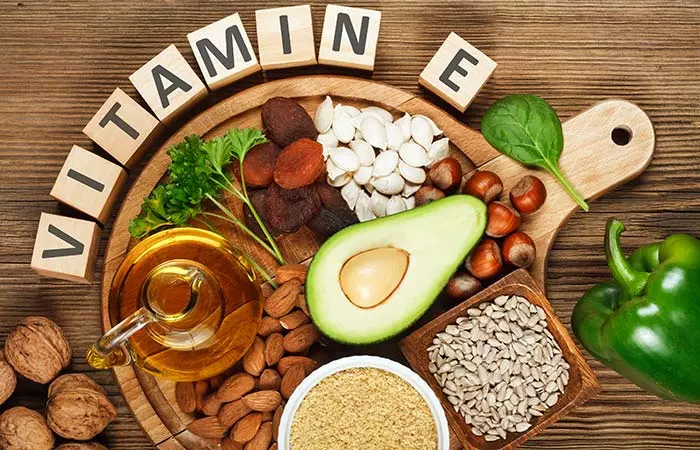
Vitamin E is a group of fat-soluble compounds with rich antioxidants. It exists in various chemical forms, of which tocopherol is the only form that can be consumed by humans.
A study was conducted to investigate the effect of tocopherol on 21 subjects with hair loss. The results showed that there was a significant improvement in the number of hairs on the participants at the end of the 8-month trial period. This is because the antioxidant activity of tocotrienolsi Chemicals from the vitamin E family with antioxidant properties that are commonly found in vegetable and rice oils. helped reduce oxidative stress in the scalp (20).
Foods Rich In Vitamin E (21)
- Almonds
- Peanuts
- Cooked spinach
- Sunflower seeds
- Dried herbs
Besides these five vitamins, there are two minerals that can also help your hair grow. Check them out below!
Key Takeaways
- Vitamins A, B12, C, D, E, niacin, folic acid, and biotin have properties that aid hair growth and treat hair issues.
- Two minerals that may stimulate hair growth and reduce hair loss are zinc and iron.
- Omega-3 and omega-6 fatty acids and proteins are macronutrients that may also promote hair growth.
- You can also consume vitamin supplements to make hair luscious and healthy.
2 Essential Minerals For Hair Growth
1. Iron
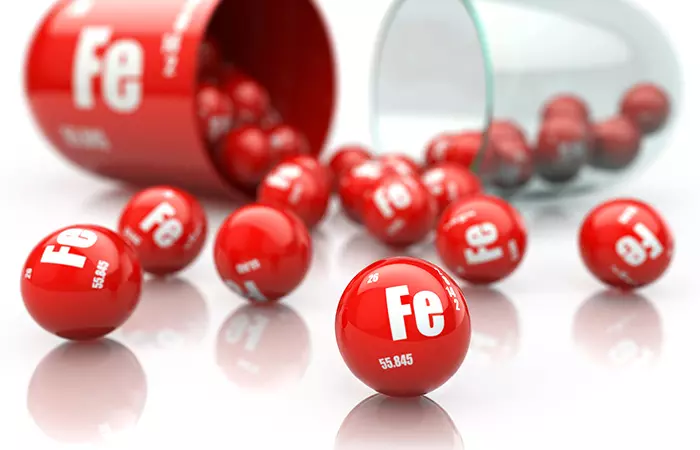
Iron is an essential mineral that supports metabolism as it helps red blood cells carry oxygen to the tissues. It is necessary for the growth, development, and cellular functioning of your body.
Research shows that 30% of women experience persistent hair shedding and reduced hair volume due to depleted iron stores in the body before the age of 50 (22), (23).
Iron deficiency is seen as one of the causes of hair loss in women with female pattern hair loss (24), (25), (26).
According to a retrospective study conducted with 343 participants diagnosed with alopecia, hemoglobin was requested by 338 (98%) patients and ferritin by 304 (88%). Of these, 20(5.8%) and 83 (24.2%) patients had anemia and iron deficiency, respectively.
Foods Rich In Iron (27)
- Breakfast cereals
- Lentils
- Kidney beans
- Spinach
- Raisins
- Apricots
- Tofu
2. Zinc
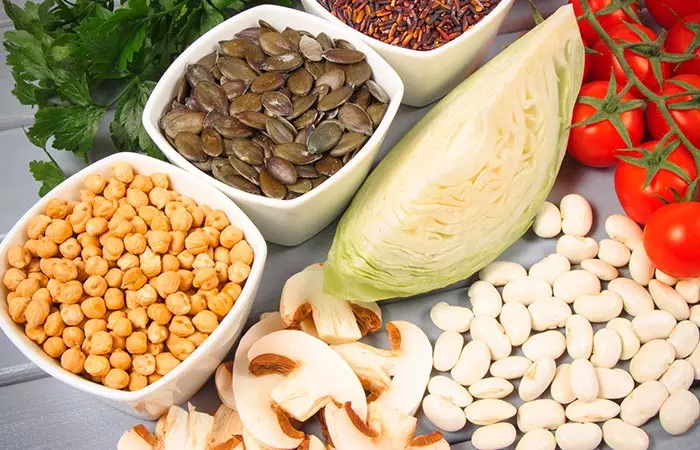
Zinc is an essential mineral that plays an important role in immune function, cell division, growth, and development.
Studies have shown that zinc deficiency causes hair loss (28), (29). Oral zinc supplements can be of great help for alopecia areata patients with low zinc levels (30).
Although zinc supplements can help improve hair loss, there are no studies that have found a direct link between them.
Foods Rich In Zinc (28)
- Nuts
- Pumpkin seeds
- Cashews
- Chickpeas
- Sweet potatoes
- Spinach
There are also some macronutrients that you can include in your diet to increase your hair growth. Find out more about them in the next section.
Essential Macronutrients For Hair Growth
1. Proteins
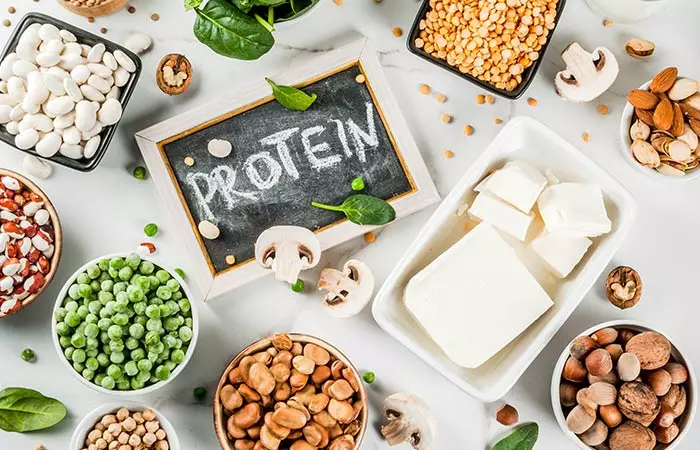
Proteins are macronutrients that are found throughout the body, including the muscles, skin, bone, and hair. Although there are limited studies on the efficacy of protein for hair growth in humans, animal studies show that protein deficiency can cause hair loss (31), (32).
High-Protein Foods For Hair Growth (33)
- Dates
- Greens
- Milk
- Paneer
- Sprouts
- Nut milk and nut butter
- Quinoa
- Lentils
- Beans
- Greek yogurt
(i) Keratin
Keratin is a vital structural protein found in hair, nails, and the outer layer of the skin. As hair is primarily composed of keratin, it plays a significant role in maintaining the strength and integrity of hair strands. Although dietary protein is essential for the body’s keratin production, specific amino acids within the protein, such as cysteine, are particularly important for hair growth.
Cysteine is one of the key building blocks of keratin, and it helps create disulfide bonds, which strengthen the hair. Adequate cysteine intake can positively impact the quality and growth of hair (34).
Foods Rich In Cysteine (35)
- Almonds
- Figs
- Cow milk
- Tofu
- Quinoa
- Salmon
- Lamb
2. Omega-3 And Omega-6 Fatty Acids
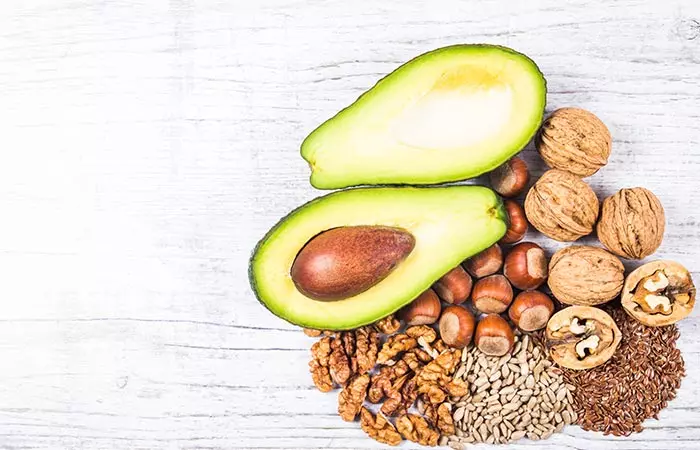
Omega-3 and omega-6 fatty acids are essential fats that are not produced by our body. They need to be consumed through foods.
Deficiency of omega-3 and omega-6 fatty acids can result in loss of scalp hair. Research also shows that arachidonic acid, an omega-6 fatty acid, may promote hair growth (36).
Foods Rich In Omega-3 Fatty Acids (37)
- Flax seeds
- Canola oil
- Chia seeds
- Walnuts
- Soybeans
Foods Rich In Omega-6 Fatty Acids (38)
- Potato
- Nuts
- Seeds
- Mayonnaise
 Quick Tip
Quick TipFollowing a healthy and balanced diet is the best way to increase your intake of all these vitamins, minerals, and macronutrients. But if you are at risk of deficiency, you can opt for vitamin supplements as well.
Vitamin Supplements For Faster Hair Growth
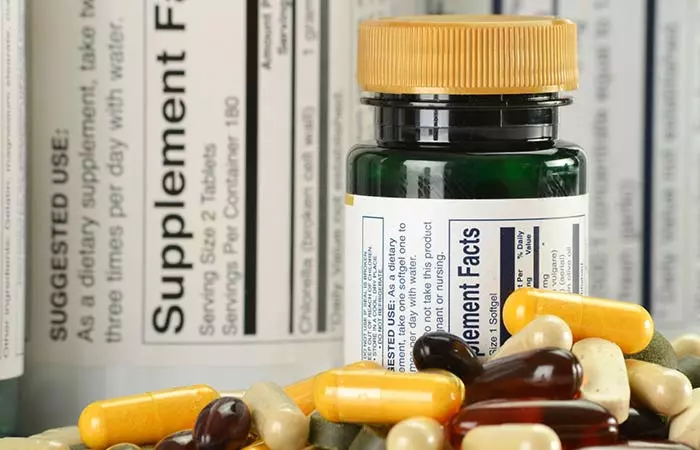
Supplements are nothing but products that contain a mix of various vitamins and minerals in the right quantities. Consumption of a supplement for faster hair growth saves time as you do not have to spend time looking for the appropriate food sources. Just make sure that you consult a healthcare professional before you start using any supplements.
Achieving enviable hair thickness and length with a gorgeous lustre will not remain an elusive dream as long as you consume foods that provide you with the right nutrition required for healthy hair. Growing your hair becomes easier when you make certain lifestyle changes.
 Quick Tip
Quick TipInfographic: Healthy Recipes Packed With Vitamins
Your hair looks and feels healthier when you consume a diet rich in vitamins and other minerals. Some surprising foods rich in vitamins A and C have a long list of holistic health advantages. Continue reading to learn about simple and delicious recipes high in vitamin C and vitamin A that you may cook to meet your daily requirements.
Some thing wrong with infographic shortcode. please verify shortcode syntax
What you eat impacts your hair. When you eat a balanced diet filled with vitamins, minerals, proteins, and other nutrients, your hair looks and feels healthier. The essential vitamins for hair growth you should add to your diet are vitamins A, B, C, D, and E. You should also consume minerals like iron and zinc to keep your hair healthy. Macronutrients like proteins and omega-3 and 6 fatty acids are important for hair health too.
You can also consume vitamin and mineral supplements to prevent any hair issues due to nutrient deficiencies. You should also maintain a healthy lifestyle by sleeping on time, being active, and practicing stress-relieving techniques.
Frequently Asked Questions
What is the best source of vitamins for hair growth – supplements or food?
While supplements can help fill nutritional gaps, obtaining vitamins from whole foods is ideal and recommended. Foods like leafy greens, nuts, fish, and eggs provide essential vitamins for hair growth alongside other nutrients and health benefits that supplements might lack.
Can taking vitamins alone improve hair growth or do they need to be combined with other treatments?
While consuming the right vitamins and minerals can boost hair growth, they alone are not enough. Using the right hair products, massaging your scalp regularly, and managing your stress levels may help boost your hair growth and improve your hair health.
What are some common side effects of taking vitamins for hair growth?
Most vitamins are safe to consume in limited quantities. However, overconsumption of vitamins may cause side effects like constipation, diarrhea, and brittle hair (39).
What are some other natural or non-invasive treatments that can be combined with vitamin supplements for optimal hair growth?
You can combine vitamins with hair massages and natural ingredients like aloe vera and yogurt to help prevent hair loss (37).
Learn about the 7 best vitamins that promote hair growth and health. Check out this video to know more about these essential nutrients and say goodbye to hair loss.
Personal Experience: Source
StyleCraze's articles are interwoven with authentic personal narratives that provide depth and resonance to our content. Below are the sources of the personal accounts referenced in this article.
i. MY ONE YEAR HAIR GROWTH JOURNEY, HAIR REGIME & BEFORE AND AFTER PICTURES; https://www.makeupandbeautyhome.com/2013/06/my-one-year-hair-growth-before-after-pictures.htmlReferences
Articles on StyleCraze are backed by verified information from peer-reviewed and academic research papers, reputed organizations, research institutions, and medical associations to ensure accuracy and relevance. Read our editorial policy to learn more.
- “Endogenous retinoids in the hair follicle and sebaceous gland” HSS Author Manuscript, US National Library of Medicine National Institutes of Health.
- “Clinical signs of anemia in vitamin A-deficient rats” The American journal of clinical nutrition, US National Library of Medicine National Institutes of Health.
- “10 Foods That Promote Healthy Hair” Sylvain Melloul International Hair Academy
- “The Role of Vitamins and Minerals in Hair Loss”: A Review
- “Management of hair loss in women” Dermatologic clinics, US National Library of Medicine National Institutes of Health.
- “A Review of the Use of Biotin for Hair Loss” Skin appendage disorders, US National Library of Medicine National Institutes of Health.
- “Biotin” National Institute Of Health, U.S. Department of Health & Human Services
- “Biotin and biotinidase deficiency” Expert review of endocrinology & metabolism, US National Library of Medicine National Institutes of Health.
- “Nutrition of women with hair loss problem during the period of menopause” Menopause review, US National Library of Medicine National Institutes of Health.
- “Folate” National Institute Of Health, U.S. Department of Health & Human Services
- “A pilot study evaluating the efficacy of topically applied niacin derivatives for treatment of female pattern alopecia.” Journal of cosmetic dermatology, US National Library of Medicine National Institutes of Health.
- “Niacin” MedlinePlus, U.S. National Library of Medicine
- “Vitamin C” National Institute Of Health, U.S. Department of Health & Human Services
- “Oxidative Stress in Ageing of Hair” International journal of trichology, National Center for Biotechnology Information, U.S. National Library of Medicine
- “Vitamin C Deficiency (Scurvy)” National Center for Biotechnology Information, U.S. National Library of Medicine
- “The Role of Vitamin D in Non-Scarring Alopecia” International journal of molecular sciences, National Center for Biotechnology Information, U.S. National Library of Medicine
- “Successful Treatment of Alopecia Areata with Topical Calcipotriol.” Annals of dermatology, National Center for Biotechnology Information, U.S. National Library of Medicine
- “Vitamin D” National Institute Of Health, U.S. Department of Health & Human Services
- “Effects of tocotrienol supplementation on hair growth in human volunteers.” Tropical life sciences research, US National Library of Medicine National Institutes of Health
- “Vitamin E” National Institute Of Health, U.S. Department of Health & Human Services
- “Causes of hair loss and the developments in hair rejuvenation.” International journal of cosmetic science, National Center for Biotechnology Information, U.S. National Library of Medicine
- “Low iron stores: a risk factor for excessive hair loss in non-menopausal women.” European journal of dermatology, National Center for Biotechnology Information, U.S. National Library of Medicine
- “Iron Plays a Certain Role in Patterned Hair Loss” Journal of Korean medical science, National Center for Biotechnology Information, U.S. National Library of Medicine
- “Iron deficiency in female pattern hair loss, chronic telogen effluvium, and control groups.” Journal of the American Academy of Dermatology, National Center for Biotechnology Information, U.S. National Library of Medicine.
- “Diffuse hair loss in an adult female: approach to diagnosis and management.” Indian journal of dermatology, venereology and leprology, National Center for Biotechnology Information, U.S. National Library of Medicine.
- “Iron” National Institute Of Health, U.S. Department of Health & Human Services
- “Zinc: an essential micronutrient” American family physician, National Center for Biotechnology Information, U.S. National Library of Medicine.
- “Zinc” National Institute Of Health, U.S. Department of Health & Human Services
- “The Therapeutic Effect and the Changed Serum Zinc Level after Zinc Supplementation in Alopecia Areata Patients Who Had a Low Serum Zinc Level” Annals of dermatology, National Center for Biotechnology Information, U.S. National Library of Medicine.
- “Protein deficiency in a colony of western lowland gorillas (Gorilla g. gorilla)” American Association of Zoo Veterinarians, National Center for Biotechnology Information, U.S. National Library of Medicine.
- “Effects of different dietary protein levels and DL-methionine supplementation on hair growth and pelt quality in mink (Neovision vision).” Journal of animal physiology and animal nutrition, National Center for Biotechnology Information, U.S. National Library of Medicine.
- “Protein in diet” MedlinePlus, U.S. National Library of Medicine
- “Diet and hair loss: effects of nutrient deficiency and supplement use” Dermatology practical & conceptual, National Center for Biotechnology Information, U.S. National Library of Medicine.
- “Cysteine Prevents the Reduction in Keratin…” Journal of Cellular Biochemistry, U.S. National Library of Medicine.
- “The antihypertensive effect of cysteine” International Journal of Angiology.
- “Omega-3 Fatty Acids” National Institute Of Health, U.S. Department of Health & Human Services
- “Omega-3 Fatty Acids” National Institutes of Health” Identification of Top Food Sources of Various Dietary Components, National Cancer Institute, National Institute Of Health, U.S. Department of Health & Human Services
- “Dietary intakes and food sources of omega-6 and omega-3 polyunsaturated fatty acids.” Springer Link.
- “Ethnopharmacological survey of home remedies used for treatment of hair and scalp and their methods of preparation in the West Bank-Palestine.” BMC Complementary Medicine and Therapies, National Center for Biotechnology Information, U.S. National Library of Medicine.
Read full bio of Dr. K. Harish Kumar
Read full bio of Arshiya Syeda
Read full bio of Eshna Das
Read full bio of Swathi E





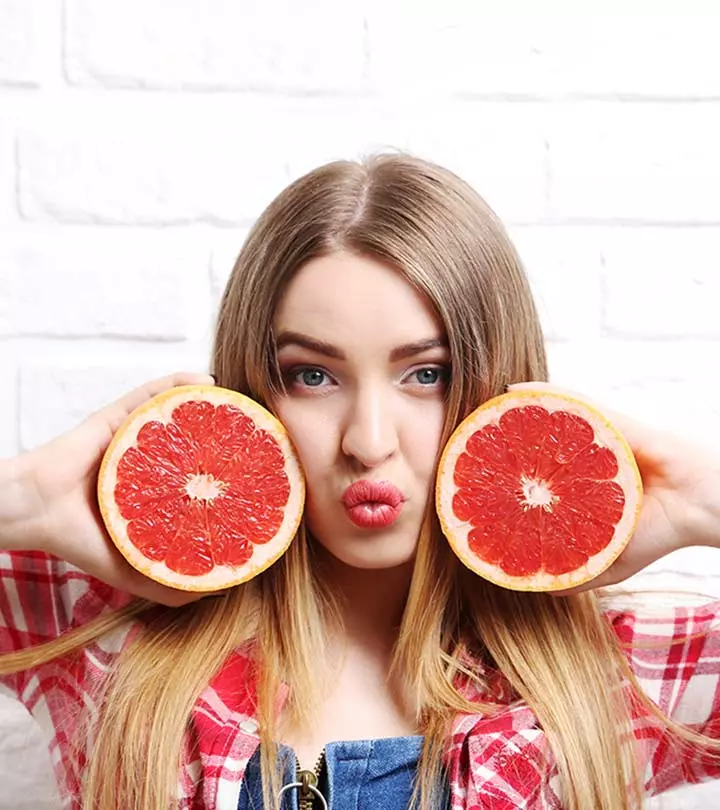
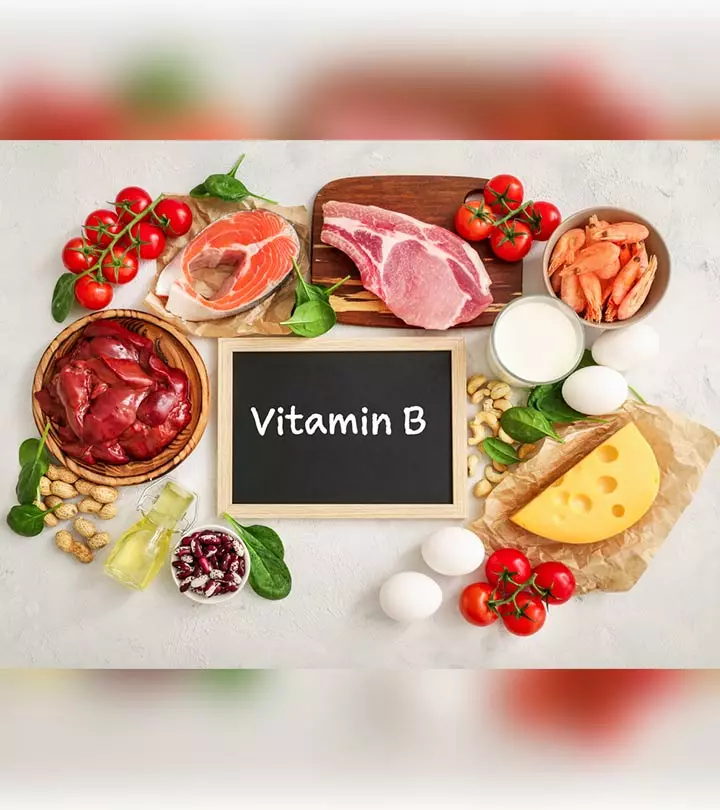
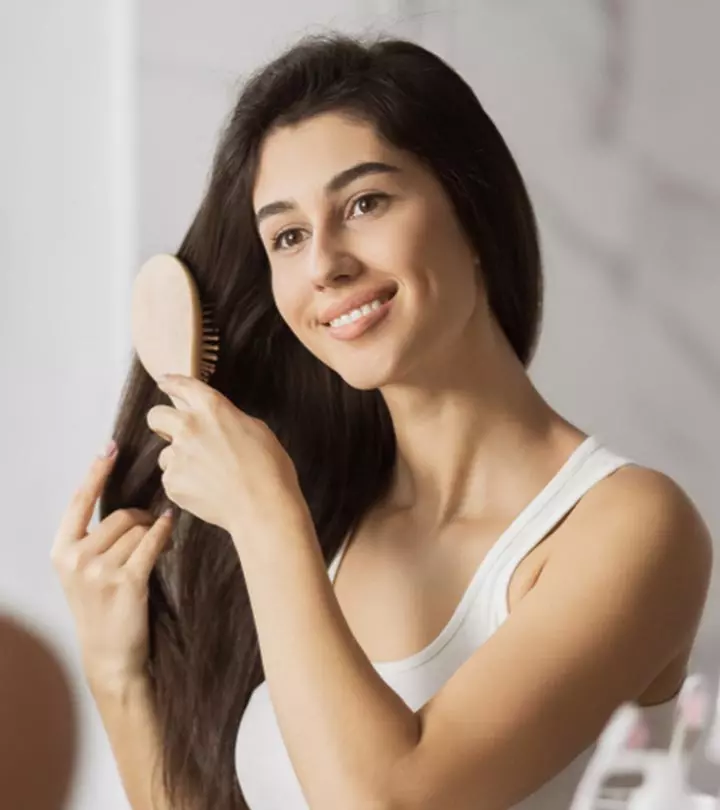
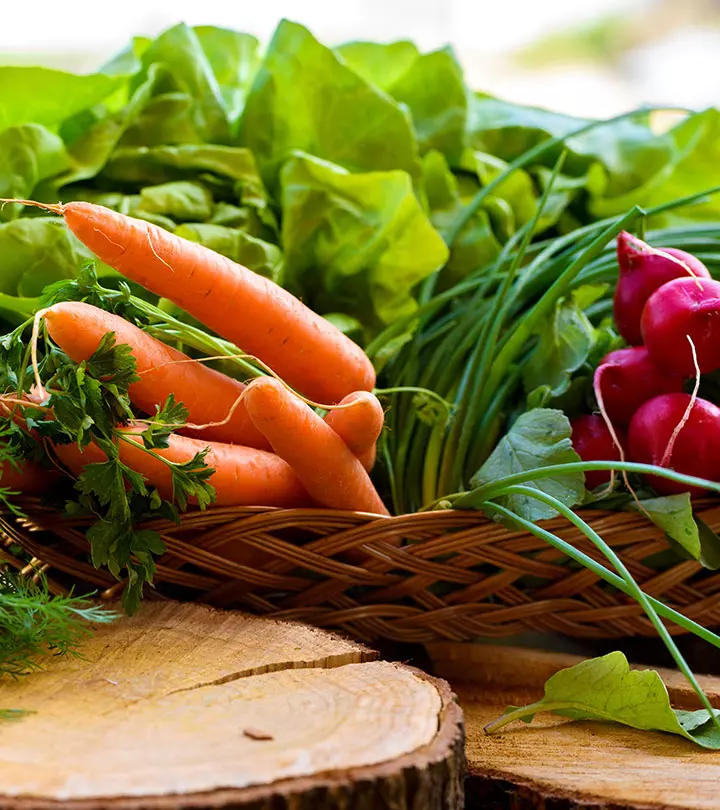
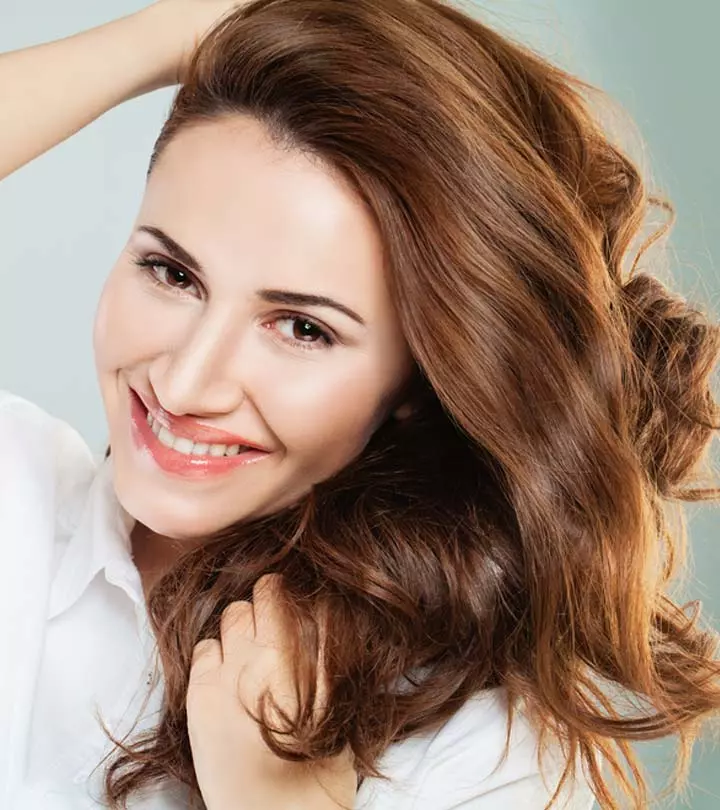
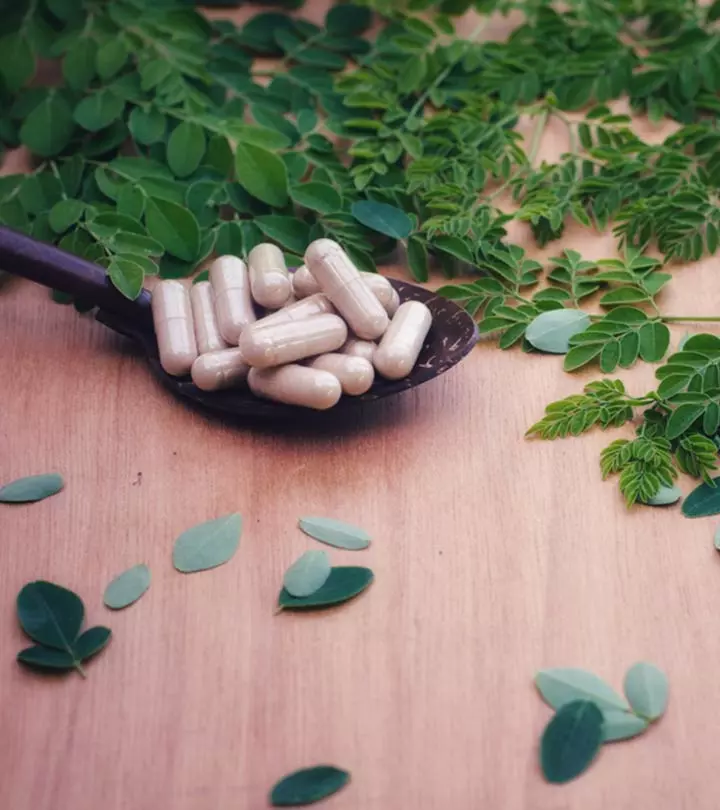


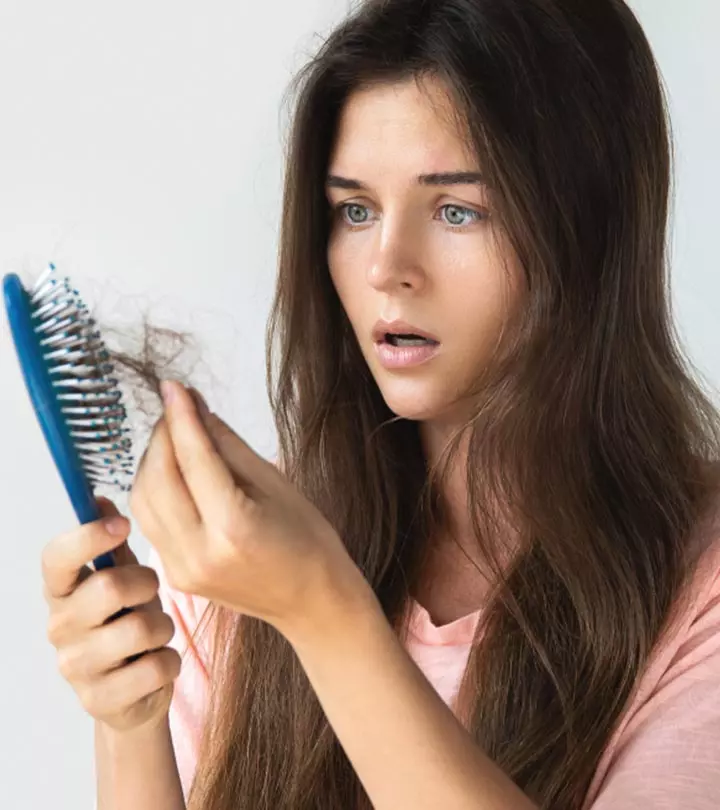
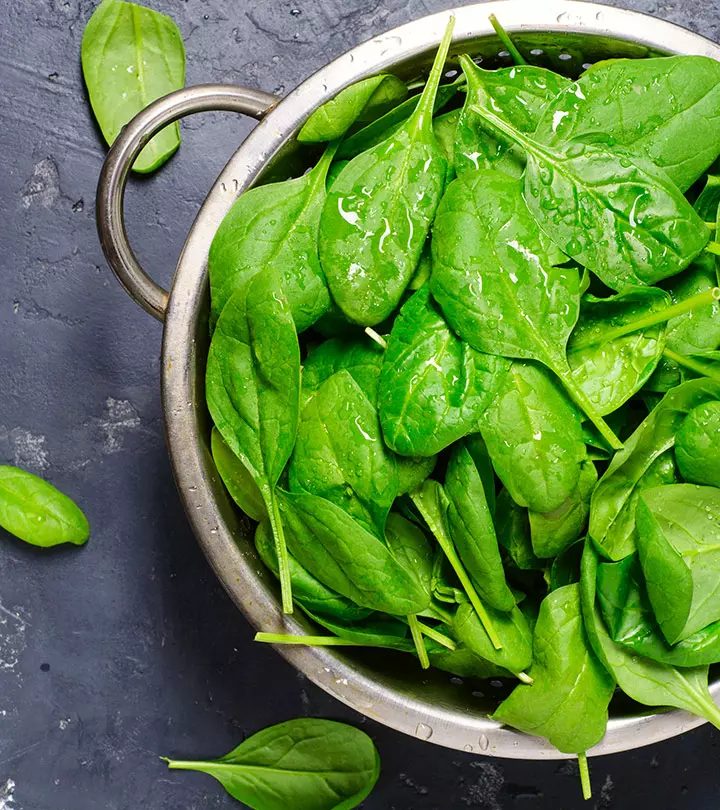
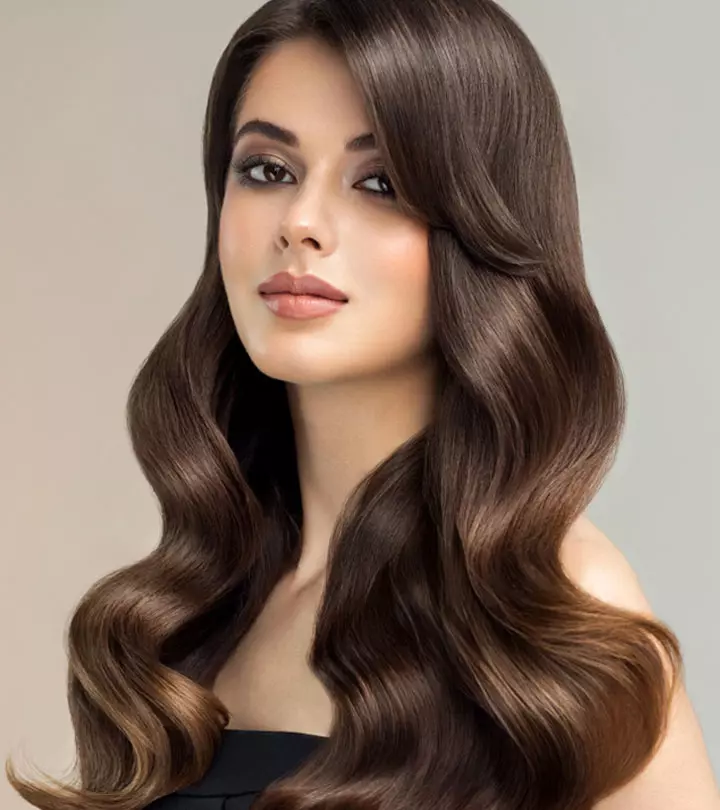
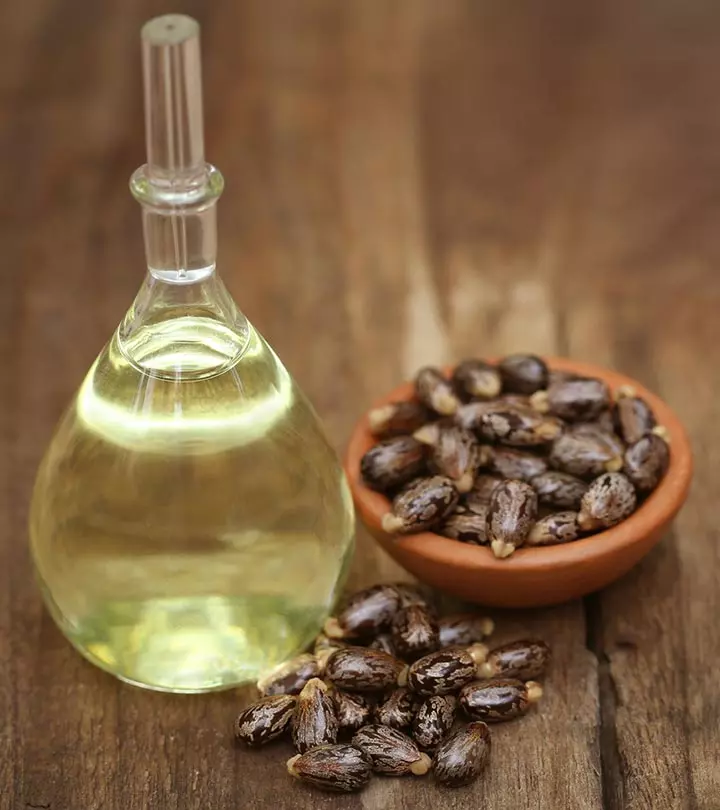
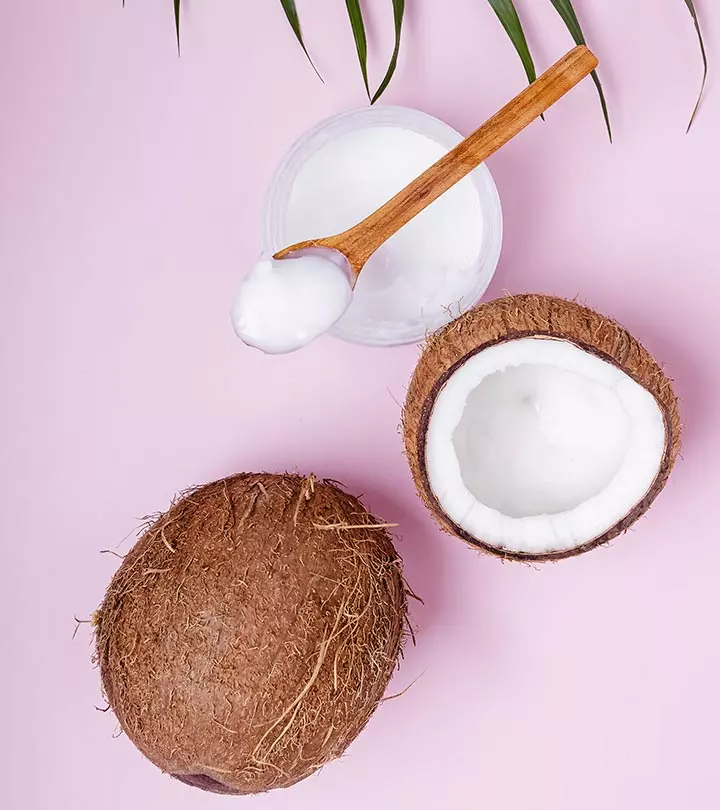
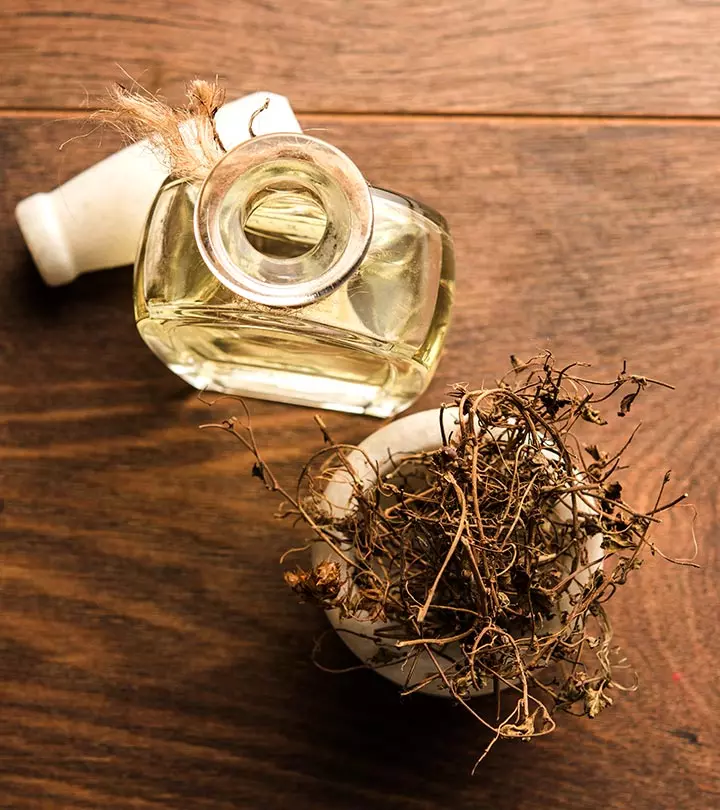
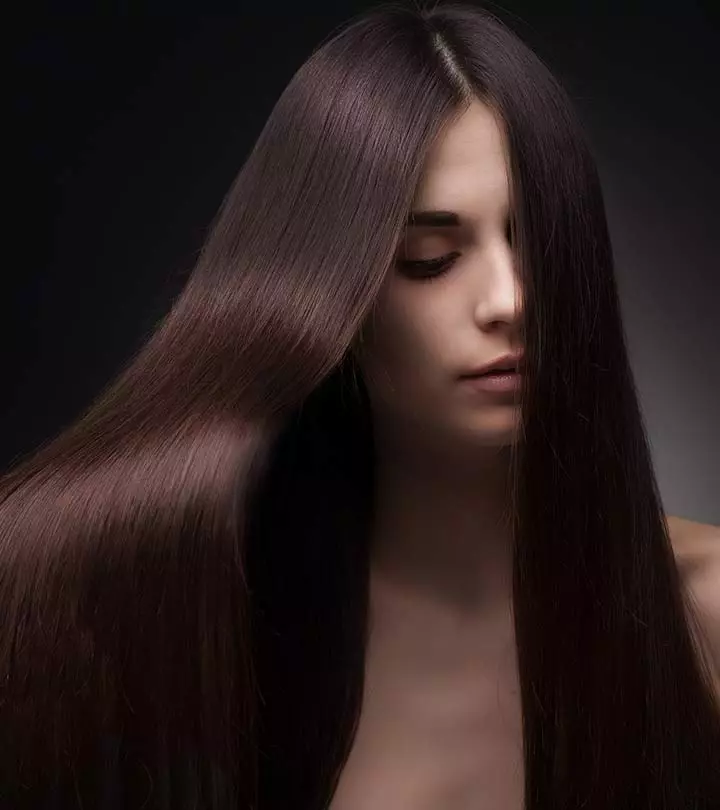
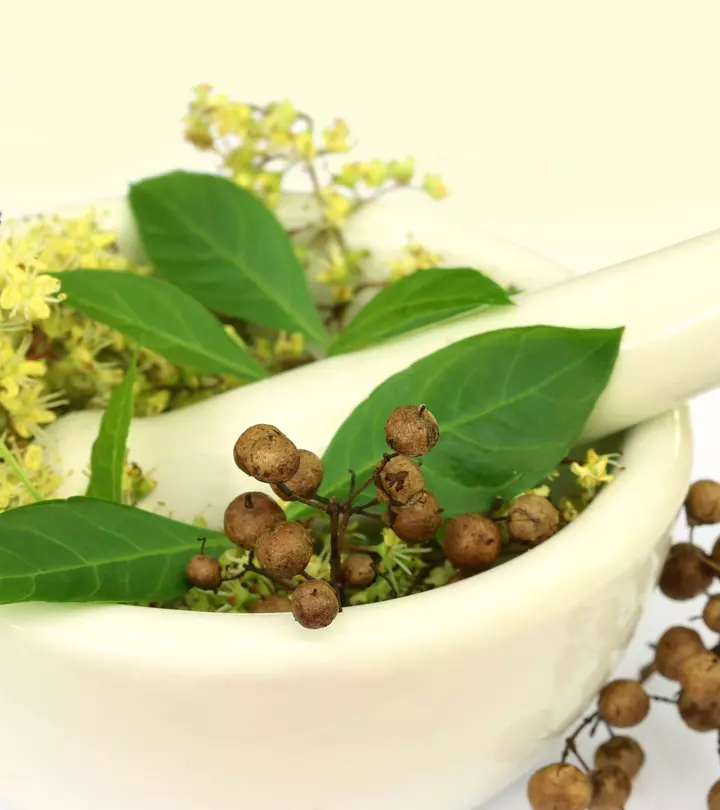
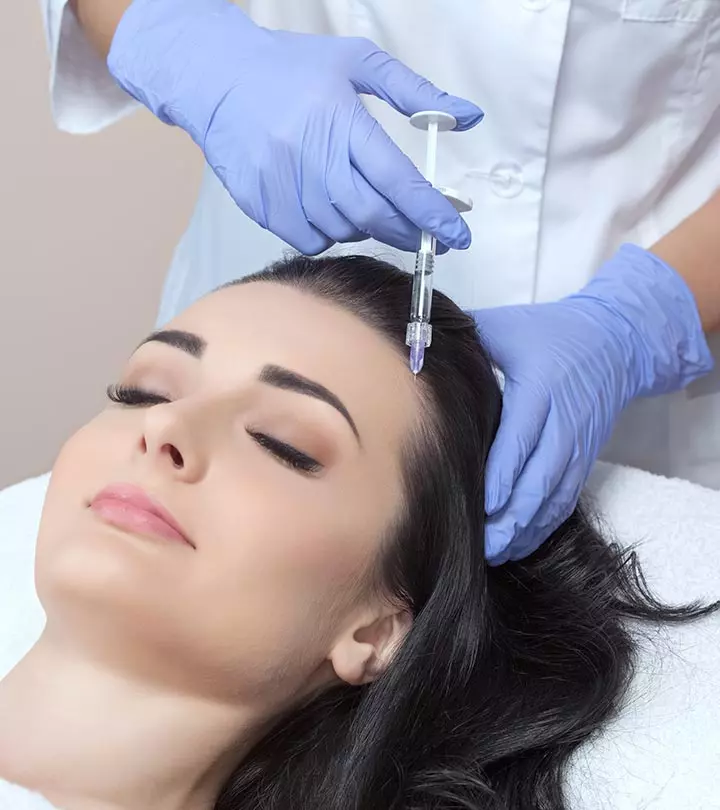

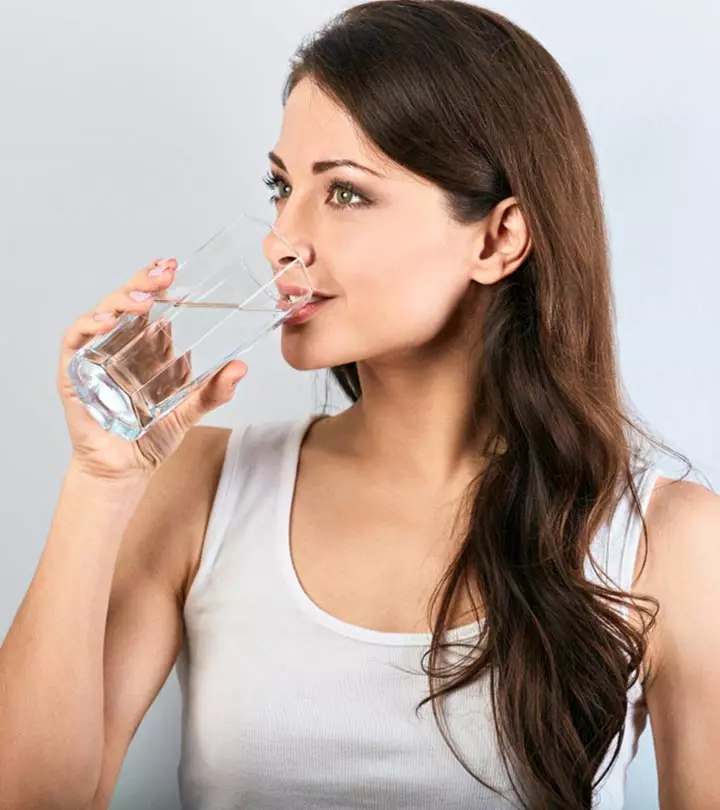
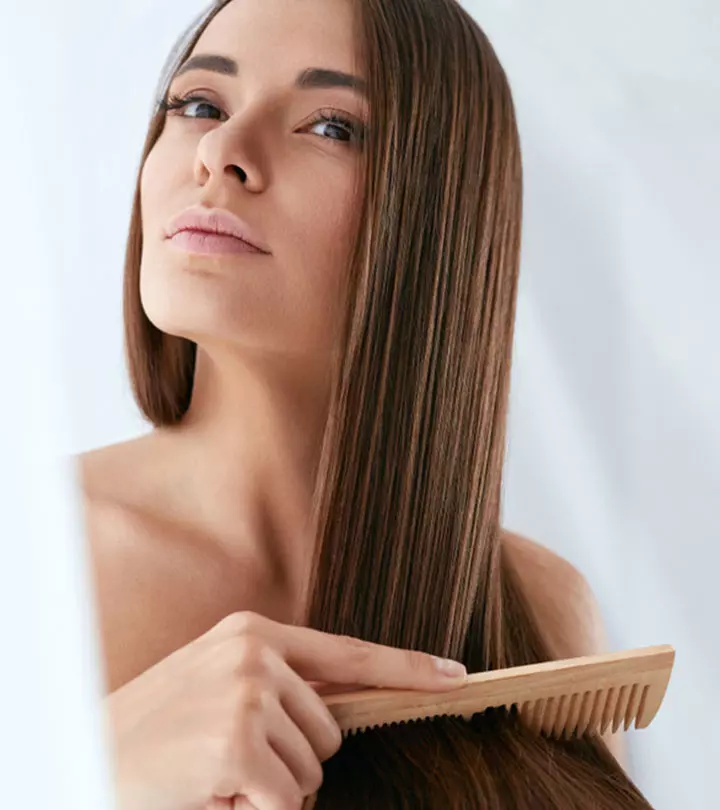
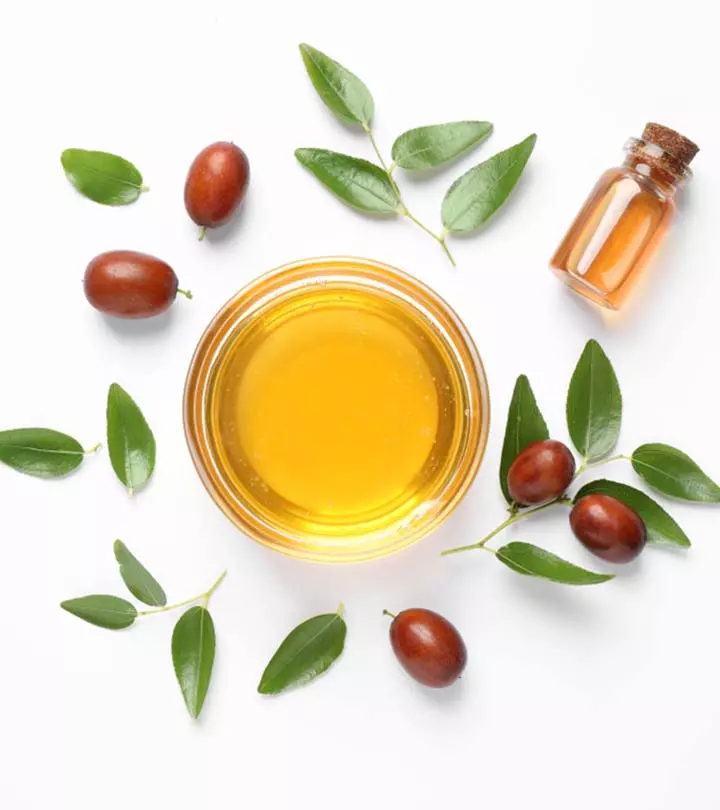
Community Experiences
Join the conversation and become a part of our empowering community! Share your stories, experiences, and insights to connect with other beauty, lifestyle, and health enthusiasts.